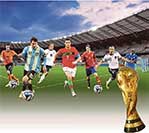INTEGRATED APPROACH: Sports and their accompanying values do offer a worthy and promising play for peace
AS the Greatest Show on Earth stands by to kick off in two days with 11-man teams each from 32 nations racing across fields for possession of a ball for 90 minutes, the tendency to view the sport particularly, and sports more generally, through the immediate, narrow lens of testosterone-driven (and appreciated) competition is perfectly understandable.
Amidst the fanatical fervour and beyond the continuing swirl of controversy surrounding preparations of the World Cup, however, it is worth taking a step back to consider the larger, affective power of sports from a slightly different angle; specifically, its place in peace and security at the individual, societal, and national levels.
FIRST, physical benefits aside, sports encourages not only a journey of self-discovery and consequently, self-esteem, but also returns a sense of belonging and empowerment to the marginalised. In some societies, this includes girls and women. In others, it includes the disabled. In yet others, it includes the troubled and underprivileged. Many professional boxers, for example, have literally fought their way out of grinding poverty, from the barrios of the Philippines to the streets of Philadelphia.
In conjunction with this year’s World Cup, social impact initiatives such as football clinics in the sprawling, gang-ridden urban favelas of Brazil will be held not only to impart skills and techniques to thousands of at-risk children but importantly, to address drug abuse, conflict resolution, and gender equality. The idea is to educate the next generation and promote self-sustainability of these lessons long after the excitement of the World Cup.
In the particular context of conflict and peace-building, sports provides a means of rehabilitating and reintegrating former child soldiers into their community, reintroducing a sense of normality and inspiring opportunities and hope for the future.
At the global level, in some cases, sporting events offer a level-playing competitive field to territories not otherwise internationally recognised as legally-constituted states.
SECOND, sports, by its very nature, cultivates cooperative and leadership skills that help sow the spirit of compromise, respect, and ideally, grace in victory and loss. The rules-based nature of competitive sports also lays the foundation for the observance of shared values, norms, and laws that underpin a functioning, mature society. Significantly, in post-conflict societies, they constitute an important bulwark against a spiralling descent into violence.
THIRD, sports acts as a conduit for transformation long after the retirement of an athlete or celebratory ceremonies of a major tournament. While the social and economic legacy of past Olympiads have traditionally had a chequered history, the expected regeneration of East London from dereliction to inspiration post-2012 has been touted as cautiously hopeful owing to pragmatic infrastructure redevelopment there.
FOURTH, even if the legacy of major sporting events like the World Cup 2014 creates more cynicism than it does confidence and tensions between nations are exacerbated rather than placated in competition, what is certain is that the mutual respect forged on the field of battle often outlasts the rivalry of the tournament. Nowhere else will you find exhausted grown men more ready to exchange their sweat-soaked national jerseys with their opponents than on the football field or badminton court. This, itself, ought to cue at least one valuable life lesson for the millions watching on –that even if you disagree, you don’t have to do so disagreeably.
The transformative potential of sports in peace and security, though, should not be over-inflated. As I was reminded at a recent conference of high-level officials, athletes, and young leaders in New York, there is often no explicit, direct, or causal relationship between sports and peace-building. Where nationalist or religious tensions are deep-seated, sports could in fact aggravate prevailing divisions on and off-field. It is worth noting as an aside that Radovan Karadzic, the Bosnian Serb leader, indicted for war crimes in Sarajevo, was a psychologist for the Red Star Belgrade football team before entering politics.
Yet, as part of an integrated approach to peace and security building, especially in complex situations, sports and their accompanying values do offer a worthy and promising –if not convoluted –play for peace.
Article by Elina Noor which appeared in New Straits Times, 10 June 2014.





